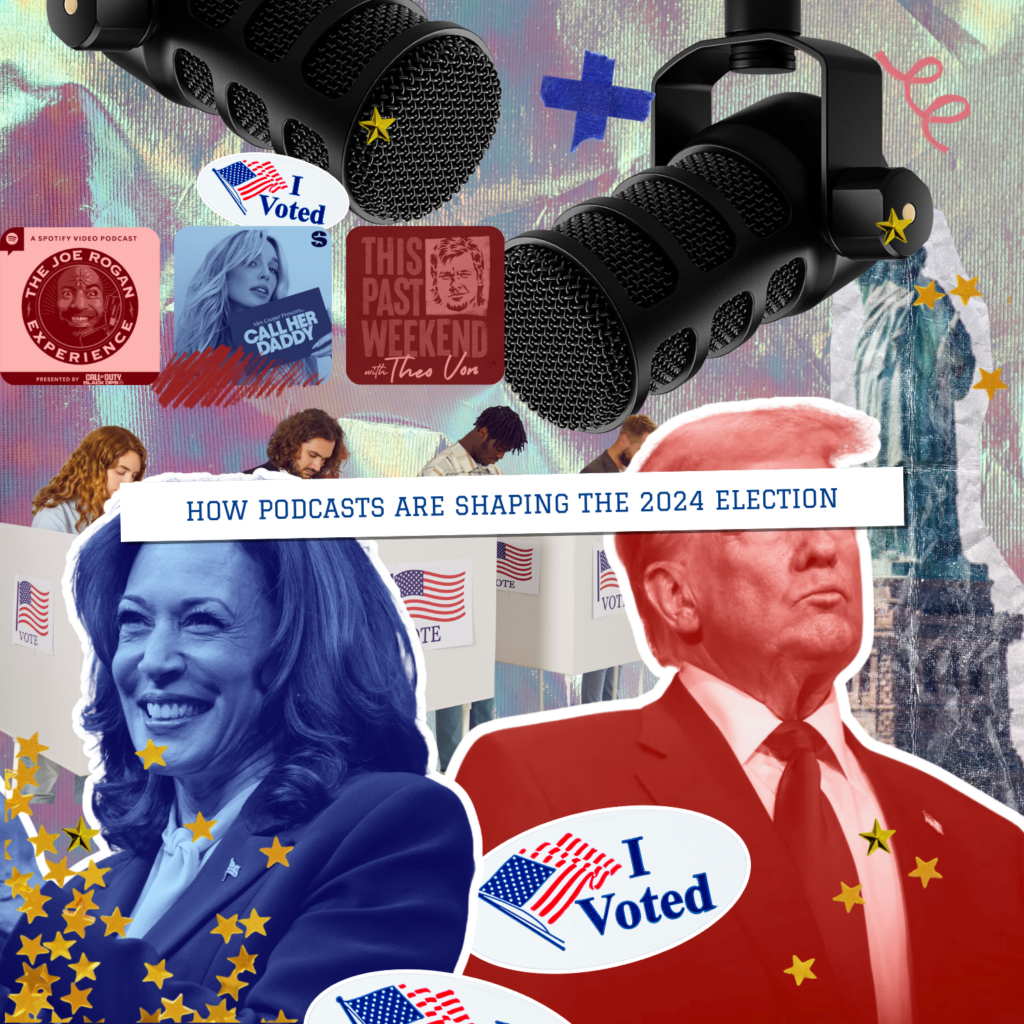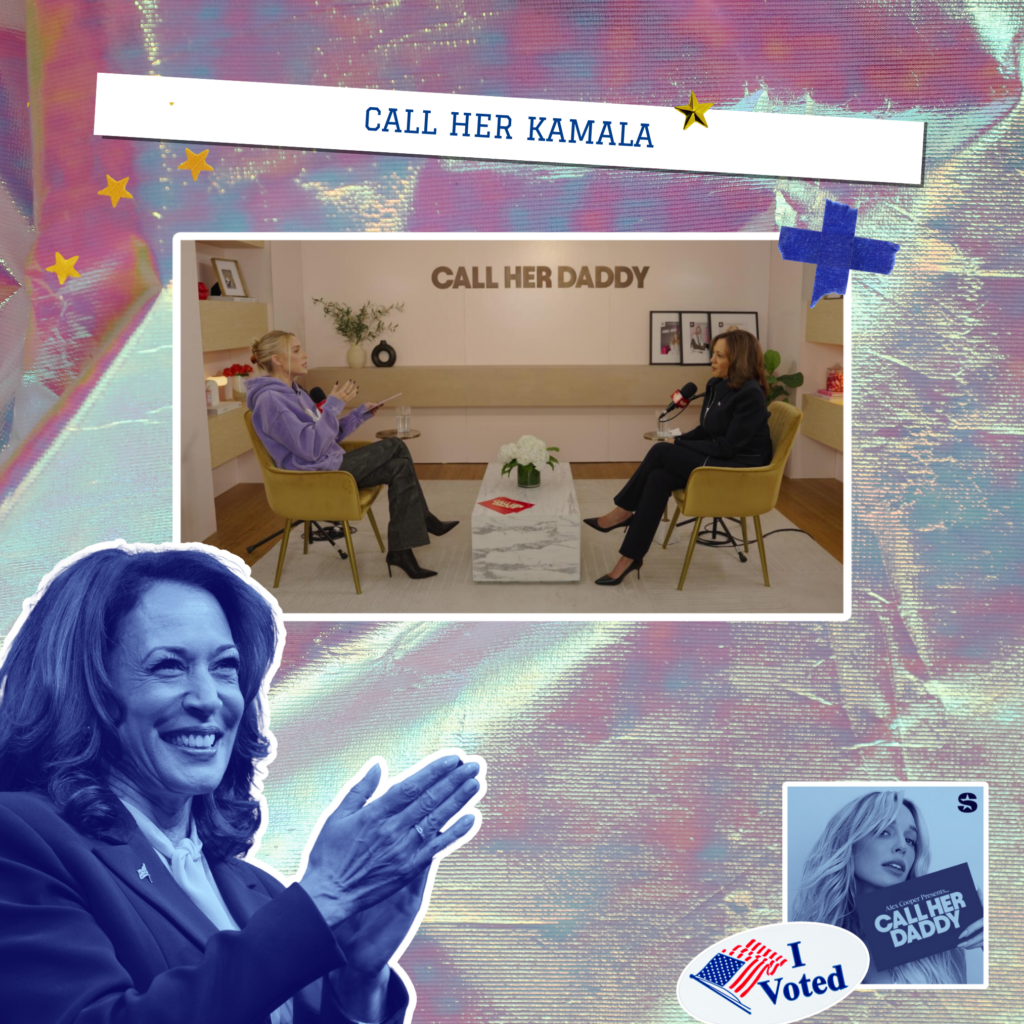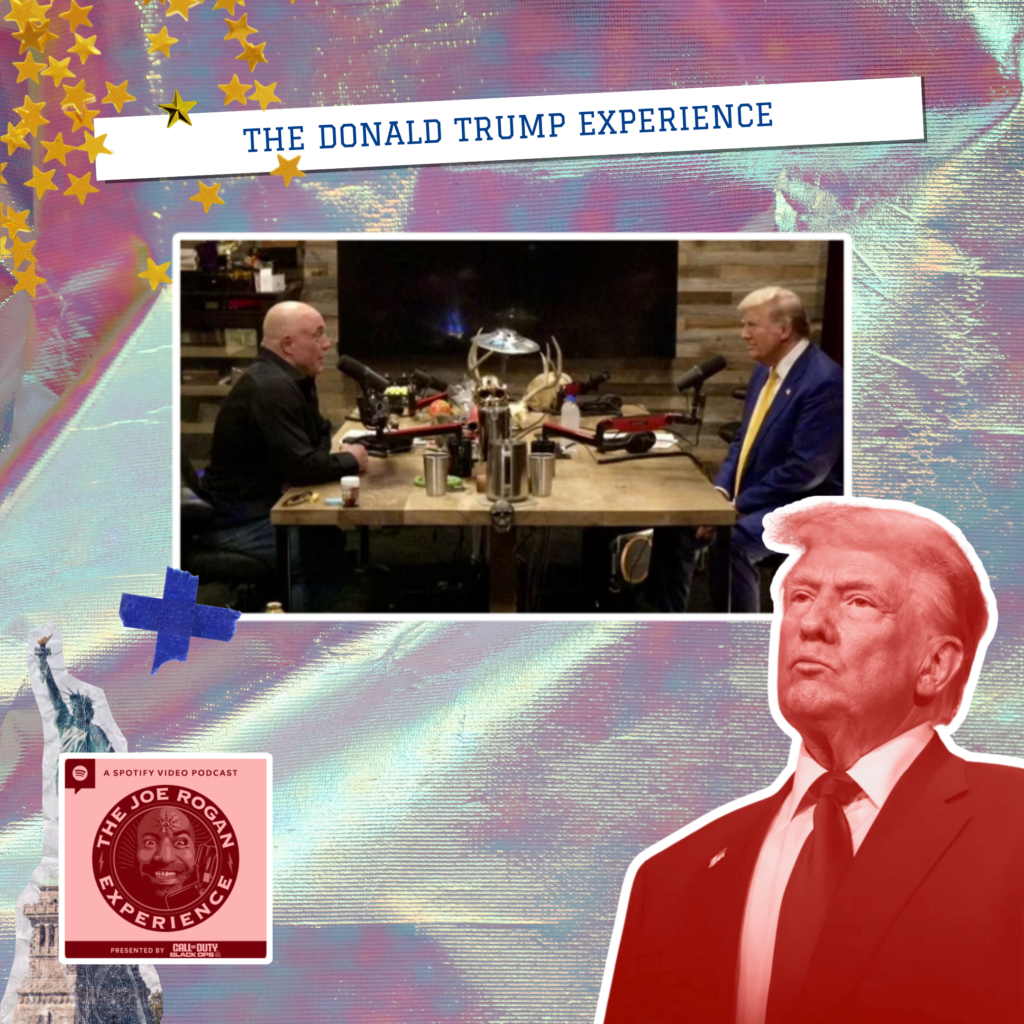How Podcasts Are Shaping the 2024 Presidential Election
October 30, 2024

In the 2024 election cycle, podcasts have taken center stage, proving that long-form, conversational media can be a transformative tool in modern politics. By appearing on top-ranked shows with millions of listeners, candidates have made podcasting a strategic choice to reach niche audiences, bridge ideological gaps, and connect with voters on a personal level rarely achieved in other media. Unlike polished television ads or curated social media snippets, podcasts offer a raw, unfiltered format that is reshaping how the public engages with political figures.
The Path to Authenticity in an Age of Skepticism
Both Donald Trump and Kamala Harris have understood that, in a political climate marked by skepticism, voters crave a genuine voice—a demand met by the candid style of podcasts. Trump’s appearances on shows like This Past Weekend with Theo Von and Full Send by the Nelk Boys cater to an audience that values brash, direct conversation. With Von, Trump’s unscripted dialogue on addiction, family, and personal choices resonated with listeners in ways traditional media rarely allows, racking up 13 million views in the process. These appearances, with their “bro-cast” appeal, tap into the loyalty of predominantly young, male audiences who value authenticity over polished campaign messages.
On the other side, Harris took a strategic approach by joining Call Her Daddy, the wildly popular show by Alex Cooper that focuses on young women’s experiences and issues. Here, she opened up about reproductive rights and mental health, touching on policies deeply personal to her audience. Critics may call this the “soft option,” yet her willingness to step into such a candid, vulnerability-centered environment highlights the new stakes in political communication: meeting voters where they are, on platforms they trust. For Harris, this meant opening up about public policy failures and even hinting at personal challenges—a rarity in political discourse that has left a lasting impression on her audience

Why Podcasts? The New “Fireside Chats” for a Distrustful Era
In some ways, today’s podcasting era parallels FDR’s fireside chats, but with a twist. The format allows listeners to immerse themselves fully in a candidate’s personality and values. Podcasts do not offer escape routes; they amplify every hesitation, every heartfelt pause, placing the candidate’s raw humanity front and center. According to Lea Redfern, a media expert at the University of Sydney, “The authenticity and intimacy for which podcasting is known could just as well work against candidates—a lack of ‘realness’ is amplified through headphones, straight into the listeners’ ears”.
It’s a high-stakes choice that has paid off for candidates willing to be real, but the risk of sounding overly rehearsed or evasive can also expose vulnerabilities to millions of listeners.
Targeting Audiences Beyond the Polls
Campaign strategists recognize that modern voters are tired of performative, rehearsed stump speeches. Instead, they crave genuine conversations that address the topics that matter in their lives. In response, candidates are targeting demographics with laser precision. Harris’s Call Her Daddy appearance was clearly aimed at politically engaged young women, a critical demographic known for high voter turnout. Trump’s visits to “manosphere”-leaning podcasts similarly allowed him to solidify his standing with young male voters who feel sidelined by traditional political discourse.
By aligning themselves with distinct, loyal audiences, these candidates have tapped into a powerful communication tool, showing podcasters that the potential for influence extends far beyond typical reach metrics. This demographic targeting reflects a broader strategy shift where politicians are no longer just chasing the highest numbers but engaging meaningfully with the subcultures of American society.
The Power of Unscripted Vulnerability
In these unfiltered settings, candidates can either captivate listeners or expose unexpected weaknesses. Harris’s discussions on mental health policy were met with both praise and critique, demonstrating the power of vulnerability to sway public opinion positively or negatively. Yet, the very structure of podcasting invites this rawness, leaving candidates to reveal elements of their humanity in ways traditional media cannot replicate.
This dynamic interplay between vulnerability and control reminds podcasters why their format matters: podcasts offer a singular opportunity to present the unvarnished, human side of public figures, appealing to audiences who crave depth over surface-level sound bites.

Five Takeaways for Podcasters: What 2024’s Election Taught Us:
- Leverage Authentic, Long-Form Content
Long-form podcasts allow guests to show more of who they are and provide context around their policies and opinions. Podcasters can harness this quality to deepen their audience’s engagement and trust by creating space for thoughtful discussions. - Target Audience-Specific Topics
The targeted approach of Harris and Trump underscores the power of aligning podcast topics with specific audience demographics. Podcasters who know their audience well can attract loyal listeners and increase relevance by addressing issues that resonate. - Create Niche Appeal by Embracing Tough Topics
Candidates tackled nuanced topics like reproductive rights and mental health, appealing to listeners who feel mainstream media glosses over these issues. Podcasters willing to address topics that speak directly to their audience’s core values can build a highly engaged listener base. - Foster an Environment for Real Conversations
Podcasting’s informal setting invites openness. Podcasters who encourage genuine conversation will find that audiences appreciate this transparency, even when discussing complex or controversial topics. - Use Your Platform to Cultivate Diverse Voices
As the 2024 election highlights, podcasting is an inclusive medium that reaches diverse audiences. For podcasters, this offers a unique opportunity to invite guests who speak directly to those underrepresented by other media platforms, fostering a broader listener base and driving meaningful impact.
A Transformative Medium for Modern Politics—and Beyond
The 2024 election has confirmed what many have suspected: podcasts aren’t merely supplemental media but pivotal spaces for shaping public narratives. As candidates continue to seek out these intimate, resonant spaces to communicate, podcasters play an influential role, bridging the gap between listeners and those in power. For those willing to embrace the risks and rewards of authentic conversations, the path forward is clear: podcasts have the power to change minds, sway votes, and, ultimately, influence history itself.
🎧 Subscribe to Podcasts for Profit on Spotify
✨ Shop Canva Templates for Podcasters
👋🏼 Learn How to Start a Podcast
Never want to miss an episode, launch or discount code? 😬 Join my e-mail list!
I will never sell your information, send you spam or be a bad penpal.
Hi, I’m Morgan Franklin. I help business owners and podcasters make money from their podcast. Whether you’re a business owner tired of trying to cut through the noise of social media, a podcaster trying to monetize their existing podcast or you want to start a podcast that will engage listeners and create future buyers. You’ve come to the right place! Through my podcast, 1:1 strategic planning, courses and free resources I’ve helped countless podcasters and future podcasters and I can’t wait to talk to you!
PRIVACY Policy | TERMS OF SERVICE | Earnings disclaimer | Terms of Purchase
© MORGAN FRANKLIN MEDIA 2024